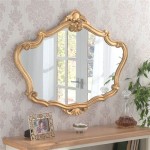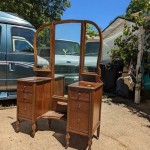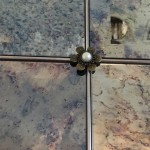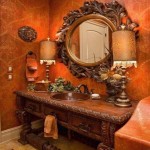Wall Mirror Meaning: More Than Just a Reflection
Wall mirrors serve a multitude of purposes, extending far beyond their practical function of reflecting images. They hold cultural, historical, and symbolic significance, impacting interior design, personal perception, and even spiritual practices. Understanding the multifaceted meaning of wall mirrors offers a richer appreciation for their presence in everyday life.
From a historical perspective, mirrors were initially crafted from polished obsidian, followed by bronze and other metals. These early mirrors were prized possessions, often associated with wealth and status. The development of glass mirrors during the Renaissance democratized their availability, leading to their widespread use in homes and public spaces. This shift signifies a transition from rarity to accessibility, transforming the mirror's cultural meaning.
In interior design, wall mirrors play a crucial role in manipulating light and space. Strategically placed mirrors can brighten a dimly lit room by reflecting natural and artificial light sources. They can also create an illusion of depth and spaciousness, making smaller rooms appear larger and more open. This functional application demonstrates the mirror's ability to enhance and modify perceived architectural limitations.
Beyond their practical applications, wall mirrors possess significant symbolic weight across various cultures. In some traditions, mirrors are believed to reflect the soul or inner self. Gazing into a mirror can be seen as an act of self-reflection, encouraging introspection and self-awareness. This symbolic association connects the physical reflection with a deeper exploration of personal identity.
Furthermore, mirrors are frequently linked to concepts of truth and illusion. The mirror's ability to accurately replicate an image yet simultaneously create a reversed version highlights this duality. This interplay between reality and its reflection has been explored in literature, art, and philosophy, further solidifying the mirror's complex symbolic nature.
In Feng Shui, an ancient Chinese philosophical system, mirrors are powerful tools for manipulating energy flow. Proper placement is crucial, as mirrors can either amplify positive energy or exacerbate negative energy. For instance, placing a mirror opposite a window is believed to reflect positive energy back outdoors, while placing a mirror opposite a cluttered area can amplify the negative energy associated with disorganization. This demonstrates the mirror's capacity to influence the perceived balance and harmony of a space.
The shape and frame of a wall mirror also contribute to its overall meaning. Round mirrors often symbolize unity and wholeness, while rectangular mirrors can represent stability and order. Ornate frames can elevate a mirror to a decorative focal point, adding to its aesthetic and symbolic value. These design choices further personalize the mirror's presence within a given environment.
In certain spiritual practices, mirrors are used for divination and scrying, where practitioners seek to gain insight into the future or the unseen. The reflective surface serves as a portal, offering a glimpse into realms beyond the physical. This mystical application adds another layer of meaning to the mirror, associating it with the exploration of the unknown.
The psychological impact of wall mirrors should also be considered. Mirrors can influence self-perception, both positively and negatively. While they can be helpful for checking appearance and boosting self-confidence, they can also contribute to body image issues and self-criticism. This highlights the importance of maintaining a healthy relationship with one's reflection.
Moreover, the presence of mirrors can influence social interactions. In public spaces, mirrors can foster self-awareness and encourage individuals to adjust their behavior. In private settings, they can enhance intimacy and create a sense of shared experience. This demonstrates the mirror's subtle yet pervasive influence on social dynamics.
The evolution of mirror technology continues to shape their meaning. Smart mirrors, incorporating digital displays and interactive features, offer new possibilities for self-monitoring and information access. This technological advancement further blurs the lines between reflection and reality, prompting ongoing reflection on the evolving role of mirrors in contemporary life.
From their historical origins as rare and valuable objects to their ubiquitous presence in modern life, wall mirrors have maintained a complex and multifaceted meaning. Understanding their functional, symbolic, and psychological implications allows for a deeper appreciation of their impact on our perception of ourselves and the world around us.

Mirror On The Wall What Is Meaning Of It All Breakthrough Savvy With Trilby Johnson

Know About Large Beveled Wall Mirrors The Whole Story From A Mirror Authority Mirrorwalla

Kashida Vertical Wooden Mirrors In Arabic Calligraphy Design

Mirror On The Wall Why Must You Be So Cruel To All Artifice

Mirror Dream Meaning Dictionary

Kashida Vertical Wooden Mirrors In Arabic Calligraphy Design

Fab Glass And Mirror Hd Tempered Wall Kit For Gym Studio 48 X 72 Inches With Safety Backing Gm48x72 The Home Depot

Meanings Mirrors And Modernism A Fragment Eruditorum Press

Hand Made Oval Shaped Wood Wall Mirror From West Nkosua Novica

Hugh Wall Mirror With Marble Shelf 24 X36 25 Reviews Cb2








